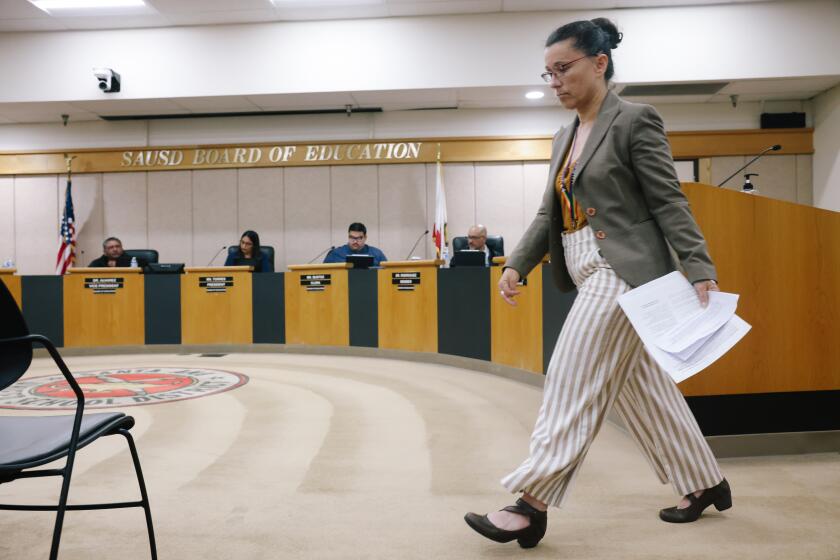Orange County Latinos are finding solace in Buddhism
- Share via
When the Orange County Buddhist Church was established more than 80 years ago, it was a refuge for Japanese immigrants and their families.
Especially after World War II, when 120,000 people of Japanese descent were held in concentration camps, the church was a place of safety, where the community could practice and preserve many of the religious rituals of its ancestral land.
But as Buddhism has gained popularity in the United States, the historically Japanese temple in Anaheim has become increasingly diverse, so that today an estimated one-quarter of OCBC congregants are not Japanese. In addition to a growing number of white practitioners — according to the Pew Research Center, 44% of American Buddhists are white — OCBC is now also home to a burgeoning group of Latino Buddhists.
“What many people like about Buddhism is that we don’t have a lot of rules about how you should live your life,” said the Rev. Jon Turner, a minister at OCBC. “We don’t have a lot that’s black and white. So if you don’t fit the mold in Christianity, where do you go? A lot of times they’ll come to Buddhism as an alternative.”
This was the case for Hector Ortiz, who grew up Baptist, but as a gay man struggled with his church’s teachings on sexuality. Buddhism seemed like a better fit.
“For me, spiritually, what makes sense is that I’m responsible for my own actions and how I interpret the world, (as) opposed to looking to others for happiness or seeking it outward,” Ortiz said. “I was drawn to the personal responsibility, seeking happiness inward and the acceptance. It felt like a place I was arriving home to, spiritually.”
But becoming Buddhist didn’t mean leaving everything from his religious past behind. Ortiz plays piano and cello for OCBC’s weekly services — something he used to do at the Baptist church he attended as a child.
“It was a nice crossover for me,” he said.
Ortiz, who is Mexican American, also sees similarities between his heritage and Japanese culture. Both are family-oriented, he said, which served as a bridge for him when he started attending the temple a decade ago and didn’t know much about the customs.
For Andy Saldana, it was familiarity with Japanese culture that came first.
After marrying a Japanese American Buddhist woman three decades ago, Saldana, who is Mexican American and was raised Protestant, started going to Buddhist temples for weddings and family events. In the 1980s, he was stationed in Japan for two years as a Marine and went to Buddhist festivals and temples almost every week.
So Saldana was already familiar with Buddhism when he joined OCBC five years ago, a decision he said was based in part on the religion’s emphasis on inquiry.
“When I grew up, 17 years in the church, you weren’t allowed to ask things,” he said. “You weren’t allowed to question the religion, the books, the teachings — anything. It’s sacrilege. But in Buddhism, you should be questioning.”
Turner said that OCBC’s long history has helped it draw a diverse group of practitioners.
Since the temple has been in Orange County for several generations, it primarily operates in English, unlike many other Buddhist temples in the area that serve newer immigrant communities and conduct services in languages such as Chinese or Vietnamese.
“We try to have a form of Buddhism that’s Americanized so it appeals to a fourth-generation Japanese person and also a Latino coming to the temple for the first time,” Turner said. “We have to be able to reach both or we’re not going to be able to make it.”
OCBC teaches Shin Buddhism, the most widely practiced denomination in Japan.
Marcia Taborga, whose family is from Bolivia, said that while Buddhism is a break from the Catholicism she grew up with, in some ways, the religion of her upbringing prepared her for OCBC. Rituals, prayers — and the idea of taking things on faith — were easier for her because she was familiar with these practices in Catholicism, she said.
“I was totally surprised that I would have to take anything on faith in Buddhism,” she said. “But I was OK okay with that, and I think part of that came from Catholicism.”
Despite these connections between Buddhism and Catholicism — and the budding congregation of Latinos at OCBC — Buddhism is still rare in the Latino community.
According to the Pew Research Center, Latinos make up 12% percent of the American Buddhist community, but Joe Garcia, a Mexican American who has been attending OCBC for five years, said that Latinos generally don’t have much exposure to Buddhism.
“I don’t think it’s on most Hispanics’ radar that it’s even a possibility,” said Garcia, who is married to Taborga. “And yet I know that in the United States, they’ve been largely moving away from Catholicism, some of them in droves. They end up going to Protestant denominations or dropping out of religion altogether. So I wish there was a way that more Hispanics could be exposed to Buddhism — to give them an alternative.”
Caitlin Yoshiko Kandil is a contributor to Times Community News.
All the latest on Orange County from Orange County.
Get our free TimesOC newsletter.
You may occasionally receive promotional content from the Daily Pilot.




